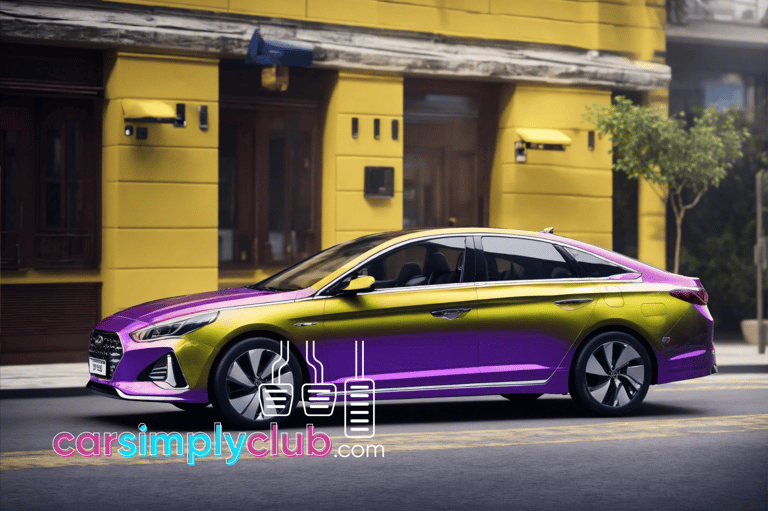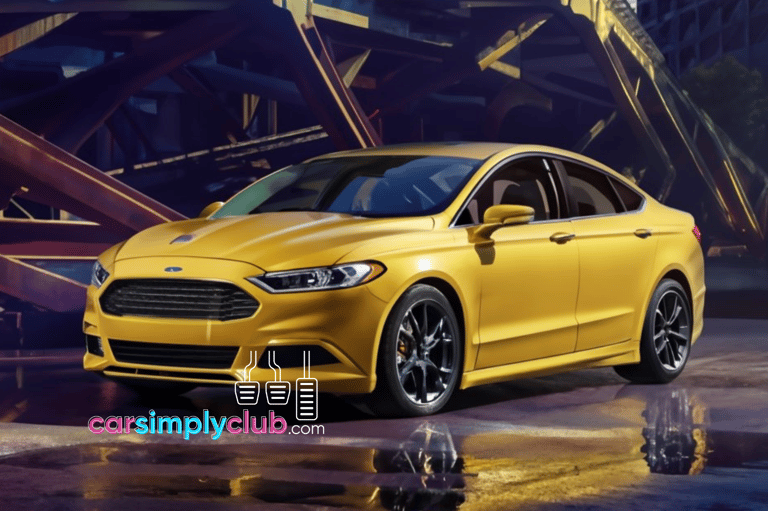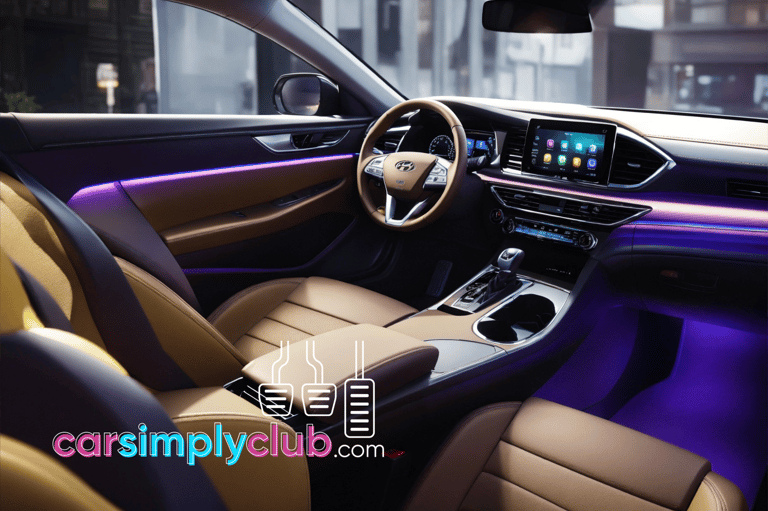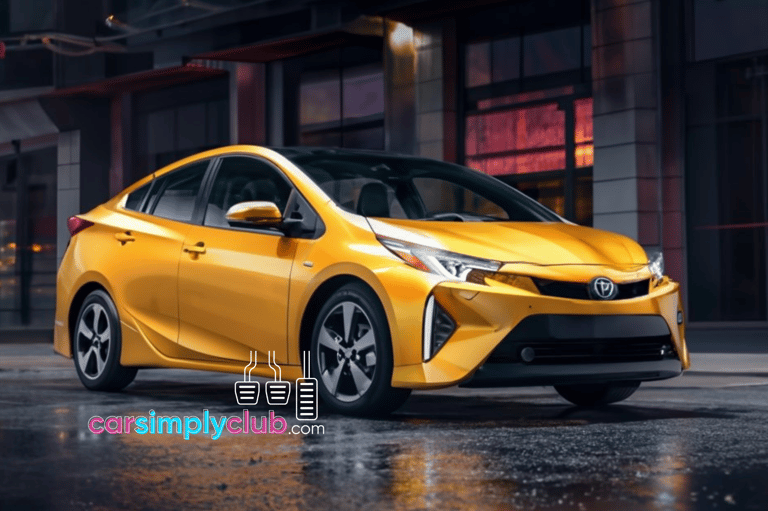Embarking on a Green Journey:
Unraveling the History and Wonders of Hybrid Cars
Explore the eco-friendly frontier with Carsimply Club's 'Car Fun Facts'!
Uncover the hybrid revolution in our concise blog, seamlessly merging gas and electric power for unparalleled energy efficiency.
Join us as we unravel the origins, spotlight innovators, and reveal today's top 5 best-selling hybrids.
Navigate the eco-conscious choice with insights into the pros and cons, steering towards a sustainable future on our roads.


What is a Hybrid Car?
Hybrid cars are a smart fusion of gasoline engines and electric motors, creating an environmentally friendly driving experience. Also, hybrid cars come in different classifications like Plug-in Hybrid Electric Vehicles (PHEV) and Hybrid Electric Vehicles (HEV), blend the strengths of gasoline engines and electric motors seamlessly and ensure both fuel efficiency and eco-friendly driving. Hybrids effortlessly switch between electric and gasoline power, offering adaptability for various driving situations. In city traffic, electric power prevails, conserving fuel and reducing emissions. On highways, the gasoline engine takes over, ensuring a smooth journey. These hybrids not only save money but also decrease our carbon footprint, making them an ideal choice for environmentally aware drivers.
Who invented Hybrid Cars?
Ferdinand Porsche invented Hybrid Cars, a brilliant mind hailing from Austria, is credited with inventing the world's first hybrid car in 1899. His groundbreaking creation marked the beginning of hybrid car technology, setting the stage for future innovations in the automotive industry.
What Country Are They From?
Ferdinand Porsche and his pioneering work in hybrid car technology originate from Austria. It was in this European nation that Porsche's innovative mind led to the birth of the first hybrid car, showcasing Austria's significant contribution to the evolution of eco-friendly transportation.


What Is the Company That Designed the First Hybrid Car?
The company responsible for designing the first hybrid car is Porsche. Under Porsche's guidance, the company Lohner-Werke, situated in Austria, introduced the groundbreaking System Lohner-Porsche Mixte. This revolutionary technology seamlessly combined electric and gasoline power, laying the foundation for the hybrid vehicles we see on the roads today. Porsche's innovation reshaped how we perceive transportation, highlighting the transformative power of hybrid technology.

Hybrid cars, with their blend of gasoline and electric power, offer distinct advantages and face certain challenges in the automotive world.
What are 3 advantages of hybrid cars?
Fuel Efficiency:
One of the standout features of hybrids is their ability to use electricity for shorter trips and lower-speed driving. This reduces reliance on gasoline, translating into significant fuel savings and fewer emissions. Hybrid owners enjoy a more economical ride, contributing to both their wallets and the environment.
Extended Range:
Hybrids provide a unique solution to the range anxiety experienced by all-electric cars. When the battery runs low, the gasoline engine seamlessly takes over, ensuring continuous operation without the need for frequent charging stops. This extended range makes hybrids a practical choice for long journeys, offering peace of mind to drivers.
Lower Environmental Impact:
Hybrids play a vital role in reducing the overall carbon footprint. By producing fewer emissions than traditional gasoline cars, hybrids contribute to environmental conservation. They serve as a bridge for individuals transitioning from gas-powered vehicles to cleaner options, making them an eco-friendly choice.
What are some disadvantages of a hybrid car?
Higher Initial Cost:
The advanced technology packed into hybrids often results in a higher upfront cost compared to conventional vehicles. While the savings on fuel can offset this in the long run, the initial investment can be a hurdle for budget-conscious buyers.
Limited Speed and Power:
Due to their dual nature, hybrids might not match the pure speed and power of their all-gas counterparts. This limitation arises from the balance between electric and gasoline components, prioritizing efficiency over sheer horsepower. It's a trade-off for their eco-friendly operation.
Maintenance Complexity:
Maintaining a hybrid vehicle requires specific expertise due to its intricate systems. From the electric motor to the battery pack, hybrids demand specialized care. Additionally, the lifespan of the hybrid battery is limited compared to traditional gas-powered engines. As a result, owners must factor in potential battery replacements, adding a layer of complexity to maintenance routines.
In weighing these advantages and disadvantages, prospective buyers must consider their driving needs, budget, and environmental concerns. Hybrids offer an innovative solution, but understanding their intricacies is key to making an informed decision in the world of sustainable transportation.
Types of Hybrid Cars: Exploring Variants and Capabilities
Hybrid cars come in various forms, each designed to cater to specific driving needs and preferences. Let's delve into the different types of hybrid vehicles and their unique capabilities.
What care the different types of hybrid cars?
Parallel Hybrids:
Parallel hybrids offer the flexibility to switch between the electric motor and the internal combustion engine, providing drivers with a seamless transition between electric and traditional power. This dual-power capability ensures adaptability to various driving conditions.
Series Hybrids:
In series hybrids, the internal combustion engine serves as a generator, producing electricity to power the electric motor. This innovative setup means that the gasoline engine doesn't directly drive the wheels; instead, it acts as a mini power generator, optimizing efficiency and reducing emissions.
Plug-in Hybrids (P.H.E.Vs):
Plug-in hybrids, or P.H.E.Vs, take hybrid technology a step further. These vehicles come with larger batteries that can be charged externally, allowing for extended electric-only driving. This feature enables P.H.E.Vs to cover more miles solely on electric power, making them an excellent choice for eco-conscious drivers.
Mild Hybrids:
Mild hybrids utilize an electric motor to support the internal combustion engine, boosting efficiency and reducing fuel consumption. While they might not offer extended electric-only driving like P.H.E.Vs, mild hybrids significantly enhance overall fuel efficiency, making them a practical option for those seeking greener alternatives.
Comparison: H.E.V vs. P.H.E.V:
When it comes to hybrid electric vehicles (H.E.Vs) and plug-in hybrid electric vehicles (P.H.E.Vs), understanding the distinction is crucial. H.E.Vs, including both parallel and series hybrids, provide a balance between electric and gasoline power, offering versatility and efficiency. On the other hand, P.H.E.Vs, with their larger chargeable batteries, prioritize electric-only driving, making them ideal for individuals who prefer extended electric range.
Each type of hybrid car has its unique advantages, catering to different driving styles and environmental concerns. By exploring these variants and their capabilities, consumers can make informed decisions based on their specific requirements and contribute to a more sustainable future on the roads.


Hybrid Cars vs. All-Electric Cars: Making the Right Choice
Choosing between a hybrid car and an all-electric vehicle requires careful consideration of various factors. Let's explore the aspects to ponder when making this important decision.
Is a hybrid better than an all-electric car?
Factors for Consideration:
When deciding between a hybrid and an all-electric car, it's essential to evaluate your driving habits. Consider how often and how far you typically drive. Charging accessibility is another crucial factor. Assess the availability of charging stations in your area and along your regular routes. Cost is also a significant consideration. Compare the initial purchase price, as well as the long-term costs associated with fuel or charging. Lastly, think about your environmental concerns. Both options contribute to reducing emissions, but your choice may still impact the environment differently.
Hybrid Advantages:
Hybrid cars offer flexibility that can ease the transition into greener driving. They have a longer overall range compared to all-electric cars because they can switch to their gasoline engine when the electric power is depleted. This extended range makes them suitable for longer journeys, providing a sense of security for drivers who might worry about running out of power.
Hybrids also offer environmental benefits. While not entirely emission-free, they still produce fewer emissions than traditional gasoline cars. For individuals looking to reduce their carbon footprint without fully committing to an all-electric lifestyle, hybrids provide a middle ground.
All-Electric Advantages:
All-electric cars excel in cost savings and reduced emissions. Over the long term, they are generally cheaper to operate due to the lower cost of electricity compared to gasoline. Additionally, they contribute significantly to reducing air pollution and greenhouse gas emissions, making them a preferable choice for those deeply concerned about environmental impact.
In summary, choosing between a hybrid and an all-electric car depends on your specific needs and priorities. If you seek flexibility, longer range, and reduced environmental impact, a hybrid might be the right choice for you. However, if you prioritize cost savings, emission reduction, and a commitment to fully electric driving, an all-electric car might align better with your goals. Evaluate these factors carefully to make an informed decision that suits your lifestyle and values.
Hybrid Car Functionality: Running on Gas and Battery
Hybrid cars are marvels of engineering, seamlessly blending two power sources for efficient driving. When the battery in a hybrid car runs out, it doesn't leave you stranded on the side of the road. Instead, these cars seamlessly transition into gas-only mode.
How far can a hybrid car go on a battery?
Hybrid Cars in Gas-Only Mode:
In gas-only mode, the car relies solely on its gasoline engine to power the wheels. This happens when the battery is depleted or in situations where the car needs more power, like during high-speed driving. Essentially, the hybrid becomes like a regular gasoline-powered car, using the internal combustion engine to generate the necessary energy to keep you moving forward.
Limitations in Gas-Only Mode:
However, there are trade-offs. When running on gas alone, hybrids sacrifice some of their fuel efficiency and environmental benefits. Remember, the primary advantage of hybrids lies in their ability to use electric power for short trips, reducing reliance on gasoline. In gas-only mode, this advantage diminishes, and the car operates more like a traditional vehicle.
While hybrids are incredibly versatile, allowing drivers to switch between gas and electric power, it's important to note that relying solely on gas does impact their overall efficiency and green credentials. As technology advances, hybrids continue to improve, but understanding their limitations in gas-only mode helps drivers make informed decisions based on their specific needs and priorities.


Exploring Hybrid Car Range and Battery Lifespan
Hybrid cars are revolutionizing how we travel, offering a unique blend of electric and gasoline power. Understanding their range and battery lifespan is crucial for any potential buyer.
How long does a hybrid battery last?
Battery Range Factors:
The range of a hybrid car on electric power alone depends on several key factors. The type of battery used, how often it's charged and discharged, driving conditions like speed and terrain, and the weight the car carries all play a role. For instance, driving at high speeds or uphill consumes more energy, reducing the electric range. Similarly, carrying heavy loads puts additional strain on the battery, affecting its efficiency.
Lifespan Considerations:
The longevity of a hybrid car's battery is influenced by various elements. The quality of the battery itself is paramount; high-quality batteries tend to last longer. Regular usage patterns also impact lifespan. If a hybrid is frequently used in electric mode, the battery undergoes more charge cycles, affecting its overall longevity. Proper maintenance, like avoiding extreme temperatures and ensuring balanced charging, can significantly extend the battery's life.
Understanding these factors empowers potential hybrid car owners. By considering how they drive, how often they'll use electric power, and the maintenance routine they follow, individuals can make informed decisions about their hybrid's battery life. As technology advances, hybrid cars continue to improve, offering longer ranges and more durable batteries, making them an excellent choice for environmentally conscious and budget-savvy drivers alike.
Understanding the Cost and Environmental Impact of Hybrid Cars
Hybrid cars are not just a choice for the eco-conscious; they're also a wise financial decision. Let's delve into the cost savings and environmental benefits that come with owning a hybrid vehicle.
What is the point of buying a hybrid car?
Cost Savings:
One of the primary reasons people opt for hybrids is the significant savings they offer. Thanks to their dual-power system, these cars are highly fuel-efficient. By relying more on electricity for shorter trips, drivers spend less on gasoline. This translates into substantial savings over time, making hybrid cars an economical choice for budget-conscious individuals. Additionally, many regions offer tax benefits and incentives for owning a hybrid vehicle, providing further financial relief to owners.
Environmental Benefits:
Hybrid cars play a vital role in reducing our carbon footprint. Their reduced emissions contribute to cleaner air and a healthier environment. Besides environmental conservation, hybrids also offer a more enjoyable ride. They operate quietly, reducing noise pollution, and provide a smoother driving experience. Moreover, hybrid owners might enjoy additional perks, such as access to dedicated electric vehicle (E.V.) lanes, making their commutes faster and more convenient.
Understanding the cost-efficiency and environmental advantages of hybrid cars can help individuals make informed decisions. By choosing hybrids, people not only save money but also actively contribute to a greener planet. As technology continues to advance, hybrid vehicles are set to become even more accessible, making sustainable and economical transportation available to a broader audience.
Challenges and Considerations in Hybrid Car Ownership
Owning a hybrid car comes with its own set of challenges and considerations that potential buyers need to keep in mind.
What's the biggest problem with hybrid cars?
Upfront Cost Challenge:
One of the primary challenges of owning a hybrid car is the higher initial cost compared to traditional gasoline vehicles. While hybrids offer substantial long-term fuel savings, the upfront investment can be a significant hurdle for many buyers. Balancing this higher cost with the long-term benefits requires careful budgeting and planning. However, it's essential to recognize that the initial investment often pays off over the vehicle's lifespan through reduced fuel expenses.
Model Reliability:
Hybrid technology varies among different models and manufacturers, leading to differences in reliability and performance. When considering a hybrid purchase, it's crucial to research and choose a model known for its reliability. Additionally, understanding the components of the hybrid system and their longevity is essential. Some hybrid models and their components might not be universally available or equally reliable, making it akin to navigating a jungle when choosing the right one. Buyers need to be diligent in their research, relying on expert reviews and user experiences to make an informed decision.
Navigating the challenges associated with hybrid car ownership requires careful consideration and planning. By understanding the upfront cost challenge and being mindful of model reliability, prospective hybrid owners can make wise choices that align with their budget and transportation needs.


What are the 5 best selling hybrid cars of all times?
Top 5 Best-Selling Hybrid Cars of All Time
The popularity of hybrid cars has soared over the years, with several models becoming favorites among eco-conscious consumers. Here's a glimpse of the top five best-selling hybrid cars that have dominated the market at the time of writing this article:
5. Ford Fusion Hybrid
With an impressive 1 million units sold, the Ford Fusion Hybrid combines efficiency and performance, making it a preferred choice for many environmentally conscious drivers.
4. Toyota Camry Hybrid
Cruising in confidently with approximately 1.8 million units sold, the Toyota Camry Hybrid offers a seamless blend of style and eco-consciousness. Its popularity highlights its reliability and eco-friendly features.
3. Honda Insight
Shining bright with an impressive 1.9 million units sold, the Honda Insight stands out for its sleek design and innovative hybrid technology. It has won the hearts of numerous drivers looking for an efficient and stylish ride.
2. Toyota Corolla Hybrid
The Toyota Corolla Hybrid takes the runner-up position with a remarkable 2 million units sold. This hybrid version of the classic Corolla brings efficiency and reliability to the forefront, appealing to a wide range of consumers.
1. Toyota Prius
Taking the crown with an astonishing 6.2 million units sold, the Toyota Prius has led the hybrid revolution since its inception. Its pioneering design and eco-friendly features have made it the poster child for hybrid vehicles, symbolizing the shift towards greener transportation options.
These best-selling hybrid cars have not only reshaped the automotive industry but have also contributed significantly to reducing emissions and conserving fuel. As more consumers embrace the eco-friendly advantages of hybrid technology, these top contenders continue to inspire the development of innovative and sustainable vehicles.
Leave a Reply
Your email address will not be published. Required fields are marked *
Join The Club!
Stay informed with Car News and Car Tech updates, and exclusive emails right in your inbox.
